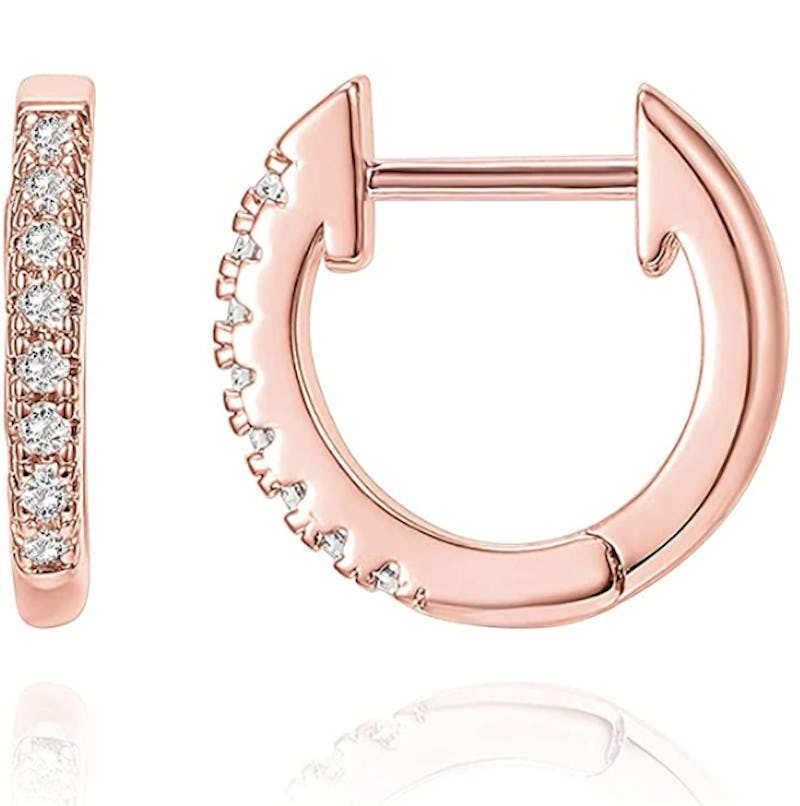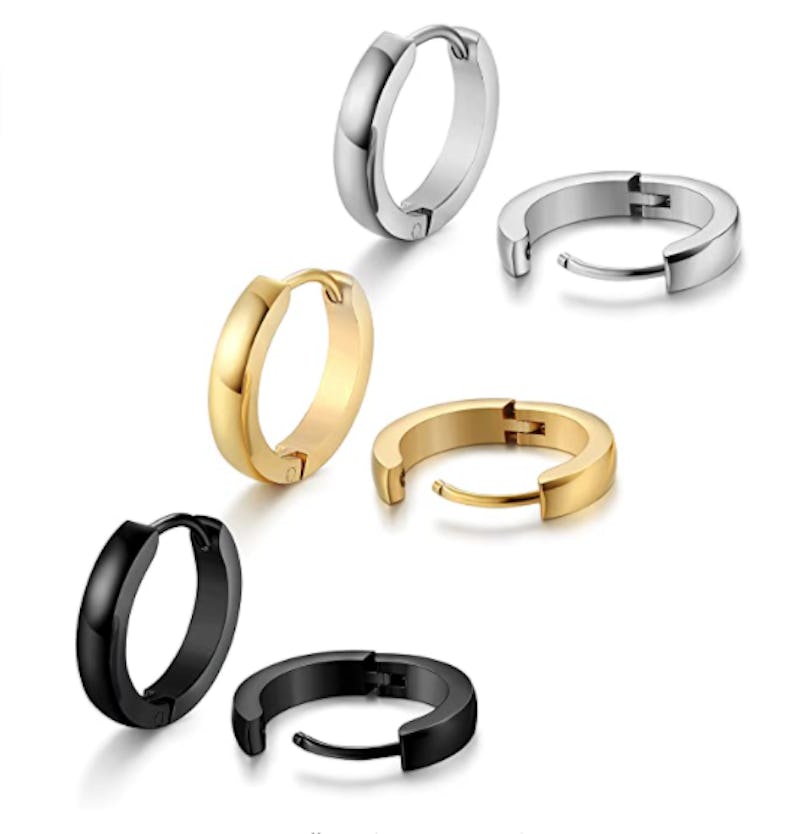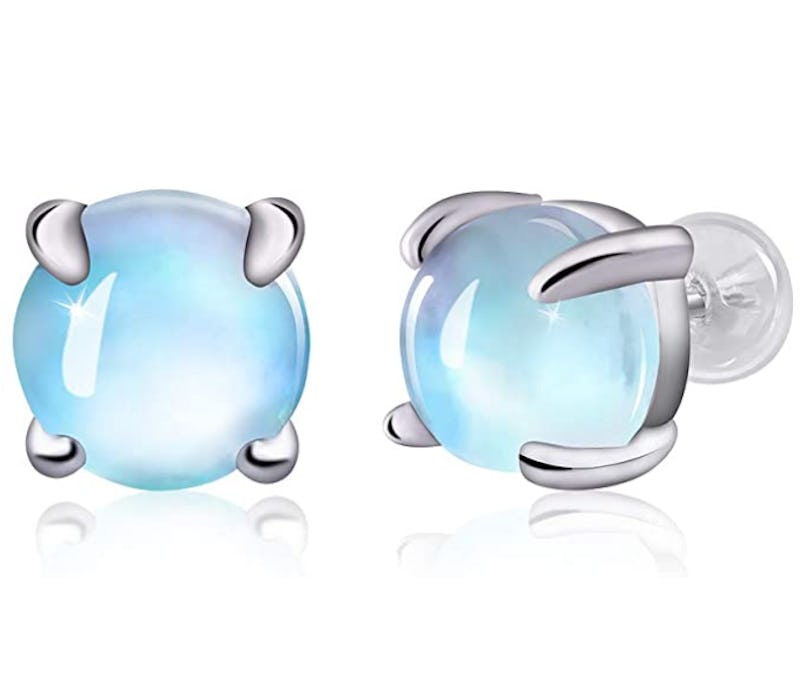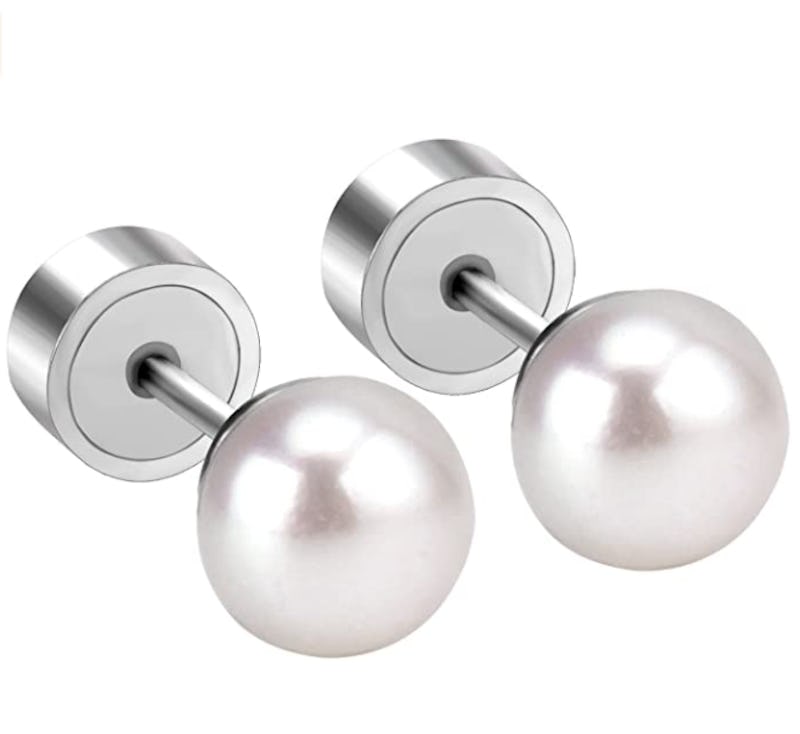Wearing earrings at night might seem trivial, but if you’re someone who leaves your earrings in all the time, finding the right kind for sleep can make a big difference. The question, “What earrings are best to sleep in?” goes beyond style—it’s about comfort, safety, and protecting your piercings.
Why Consider Earrings That Are Safe for Sleeping?
For many people, comfort and safety are critical when it comes to earrings worn at night. While sleeping in earrings isn’t essential for everyone, it’s quite common, especially for those with newly pierced ears or people who wear earrings daily. Choosing the best earrings for sleeping involves understanding why some designs and materials are more suitable than others. Here’s why finding sleep-safe earrings matters.
Comfort and Safety
Sleep-safe earrings provide a blend of comfort and safety that ensures you can wear them overnight without any issues. Imagine a scenario where you’re wearing large or heavy earrings to bed. These can press into the side of your head if you sleep on your side, causing discomfort that disrupts sleep. They may also dig into your skin or even risk injury if they catch on your pillow or hair. Flat, low-profile earrings, like stud earrings with flat backs, minimize these risks by lying close to the earlobe and not protruding.
For side sleepers, in particular, comfort is crucial. Earrings with bulky backs can create pressure points, making it difficult to fall asleep comfortably. Lightweight, secure, and non-protrusive designs make all the difference, allowing you to sleep undisturbed without sacrificing your favorite jewelry.
Skin Health
Skin sensitivity is another factor that makes sleep-specific earrings essential. Certain materials, like nickel, can cause irritation or allergic reactions, especially with prolonged wear. This is even more pronounced overnight, as the skin is in continuous contact with the metal. People with sensitive skin or allergies should opt for hypoallergenic options, such as titanium, surgical steel, or high-quality gold. These materials are not only durable but also reduce the risk of redness, itchiness, or infection.
For those with fresh piercings, this is particularly important, as sleep-safe materials promote healing without additional irritation. Wearing hypoallergenic earrings can maintain the health of your skin and the integrity of your piercings over the long term.
Minimizing Damage to Earrings and Piercings
Wearing unsuitable earrings overnight can also damage the piercings themselves. Heavy earrings can tug at piercings, causing them to stretch over time. Earrings with sharp or uneven edges can snag on fabric, hair, or even your bedding, potentially leading to tearing or other painful injuries. Flat-back earrings, sleeper hoops, and huggies are specifically designed to minimize these risks, as they are smooth, lightweight, and less likely to catch on surrounding surfaces.
Sleeping in well-chosen earrings not only helps maintain the integrity of your jewelry but also preserves the health of your piercings. By investing in the right type, you avoid unnecessary stretching, infections, and other complications, making your nightly routine both comfortable and safe.

Types of Earrings Best for Sleeping
Choosing the right earrings for sleep requires a closer look at earring styles specifically designed to provide maximum comfort and safety. Below, we explore the types of earrings best suited for overnight wear, with a focus on hypoallergenic materials, secure designs, and those that protect both your ears and your jewelry from damage.
Hypoallergenic Stud Earrings
Hypoallergenic studs are some of the best earrings to sleep in, especially for those with sensitive skin. Stud earrings are inherently comfortable for sleeping because they sit close to the earlobe, minimizing any protrusion that might cause discomfort while lying down. Hypoallergenic materials—like titanium, surgical steel, and 14K gold—are the ideal choice for studs worn overnight because they reduce the risk of allergic reactions, redness, and irritation.
Many people find that hypoallergenic studs are versatile, too. They can be worn day and night without causing skin issues. Titanium and surgical steel are particularly popular for sleep because they’re strong yet light, making them easy to forget about once in. 14K gold is also a safe choice, as it’s less reactive than lower-quality metals. However, higher-karat gold (18K or above) can sometimes be too soft and may bend or scratch easily, making 14K a balanced choice for durability and comfort.
Flat-Back Earrings
Flat-back earrings are gaining popularity as some of the best earrings for continuous wear, including during sleep. Unlike traditional earring backs that can poke into the skin, flat backs are smooth and rest comfortably against the earlobe. This design is especially beneficial for side sleepers, as the flat backing prevents pressure points from forming on the back of the ear.
Flat-back earrings come in a range of materials and styles, from minimalist studs to tiny gems and shapes. For anyone with multiple piercings, flat-back earrings are an excellent choice for the lower or side piercings, as they are less likely to tangle with other jewelry. They are often available in hypoallergenic metals, making them suitable for individuals with sensitive ears. Many brands offer “threadless” flat-back earrings that use tension to stay securely in place, further enhancing their comfort and safety.
Sleeper Hoops and Huggies
Sleeper hoops were originally designed for new piercings, making them one of the best options for anyone who prefers hoops but still wants to wear their earrings to bed. Sleeper hoops are usually thin, small, and lightweight, fitting closely to the earlobe without any sharp edges. They are known for their comfort and minimalistic design, which makes them safe for overnight wear. Unlike traditional hoops, which may have clasp mechanisms that could poke or scratch, sleeper hoops often feature a seamless closure, reducing the chance of any irritation.
Huggie earrings are small, snug hoops that “hug” the earlobe, giving a similar effect to sleeper hoops but often with a more decorative style. These earrings are popular for sleeping because their secure closure prevents them from catching or falling off. Many huggies are available in hypoallergenic materials, providing an option for those who want a secure, stylish earring that can be worn day and night without discomfort.
Silicone and Lightweight Plastic Earrings
Silicone and lightweight plastic earrings are increasingly popular for those seeking extra comfort and flexibility during sleep. Silicone is soft and pliable, making it ideal for sleepers who want to avoid the feel of metal. Plastic earrings, particularly those made from medical-grade plastic, can also be a good alternative to metal for people with severe metal allergies.
These materials are especially gentle on sensitive skin and reduce the chance of any pressure or irritation, as they are lightweight and flexible. Additionally, because they lack sharp edges or heavy components, they minimize the risk of any discomfort while tossing and turning. Silicone earrings are also a budget-friendly option, and they’re easily available in a variety of colors and shapes, allowing for personalization.
Clip-On Sleep Earrings
For individuals without piercings, clip-on earrings designed for sleep offer a comfortable alternative. These are often made with soft, padded clips that rest gently on the earlobe without applying too much pressure. Clip-ons made from hypoallergenic materials, like silicone-padded clasps, can be comfortable enough to wear all night.
Clip-on sleep earrings are also convenient for those who might want to avoid traditional earrings altogether but still enjoy the look of jewelry. They can be easily removed before bed if desired and are generally low-maintenance. Additionally, clip-ons eliminate any risk of damaging the earlobe or piercing, as there’s no need for a punctured ear.
These earring styles—hypoallergenic studs, flat-back earrings, sleeper hoops, huggies, silicone, lightweight plastic, and clip-ons—offer a range of options that prioritize comfort, safety, and style. By choosing one of these types, you can rest easy knowing your earrings won’t disrupt your sleep or irritate your ears.

Materials to Look For in Sleep-Friendly Earrings
The materials of your earrings are just as important as their design when it comes to choosing sleep-friendly jewelry. Certain metals and materials are more comfortable, less likely to cause allergic reactions, and better suited for continuous wear. Here’s a breakdown of the best materials for earrings you can sleep in, and why these choices make a difference.
Hypoallergenic Metals
Hypoallergenic metals are a top choice for anyone with sensitive skin or those who prefer to wear earrings overnight. Metals like titanium, surgical stainless steel, and 14K gold are particularly good options, as they are known to cause fewer allergic reactions. Here’s why these metals are beneficial:
- Titanium: This metal is lightweight, strong, and naturally hypoallergenic, making it a top choice for sensitive ears. Titanium earrings are often used for new piercings because they don’t irritate the skin or cause reactions, even with prolonged wear. Titanium also doesn’t tarnish, so it maintains its appearance over time.
- Surgical Stainless Steel: Another hypoallergenic option, surgical stainless steel is durable and resistant to tarnish, making it suitable for both short-term and continuous wear. It’s commonly used for body jewelry because it’s safe for the skin and can withstand the moisture and natural oils produced overnight.
- 14K Gold: Gold in higher purities (14K and above) is generally considered hypoallergenic, especially when alloyed with skin-friendly metals like copper. 14K gold strikes a good balance between purity and durability, as higher-karat gold can be too soft and may bend or scratch. White gold should be checked for rhodium plating, as some white gold alloys contain nickel, which could cause reactions.
- Niobium: Less common but highly recommended, niobium is another hypoallergenic metal that is as lightweight as titanium. It’s available in various colors and is resistant to corrosion, making it a suitable choice for earrings worn day and night.
Non-Metal Alternatives
For people with severe metal sensitivities, non-metal materials can offer a comfortable alternative for sleep-friendly earrings. Materials like silicone and bioplast are popular for their flexibility and softness, allowing for a near-weightless feel while you sleep.
- Silicone: Soft and flexible, silicone earrings are ideal for those who want an entirely non-metal option. They are gentle on the skin, don’t cause allergic reactions, and come in a variety of styles. Silicone earrings are especially useful for children or individuals who experience extreme sensitivity to metals.
- Bioplast: Bioplast is a biocompatible plastic that’s safe for sensitive skin and is commonly used in body jewelry. It’s highly flexible and resistant to body fluids, making it both comfortable and hygienic for overnight wear. Bioplast can also be cut to size, making it customizable for different piercings.
Nickel-Free Options
Nickel is one of the most common allergens in jewelry, and it can cause redness, itching, and irritation, especially when worn for long periods, like overnight. Nickel-free earrings are essential for anyone with nickel sensitivities, as even a small amount of nickel in the alloy can trigger a reaction.
When shopping for nickel-free options, look for labels indicating “nickel-free,” “hypoallergenic,” or “nickel compliant.” Reputable brands often specify if their earrings contain no nickel. Gold earrings that are 14K or above usually contain less or no nickel, and titanium and surgical stainless steel are generally nickel-free as well.
By selecting earrings made from hypoallergenic metals, non-metal alternatives, or nickel-free options, you can enjoy a safe and comfortable experience without worrying about skin irritation or allergic reactions. These materials are excellent choices for sleepers looking for comfort and peace of mind, making it easier to choose earrings that feel great around the clock.

What to Avoid in Earrings Worn Overnight
While certain types of earrings are designed for comfort and safety, others can lead to discomfort, skin issues, or even damage to your piercings when worn overnight. Knowing what to avoid in sleep-friendly earrings is crucial to protecting your ears and maintaining the health of your jewelry. Here are some key factors to consider when choosing earrings for sleeping.
Avoid Heavy Earrings
Heavy earrings can strain your earlobes, causing stretching over time. When worn overnight, the constant downward pressure from heavier earrings can pull on the piercing, which can lead to sagging or even tearing of the earlobe tissue. For a comfortable night’s sleep, look for lightweight options such as studs, small hoops, or flat-back earrings, which are less likely to exert unnecessary pressure on your ears. Generally, if an earring feels noticeably heavy during the day, it’s best to remove it before bed.
Dangling or Sharp-Edged Designs
Dangling earrings, hoops with decorative attachments, or earrings with sharp edges are not suitable for sleeping. These designs can easily catch on bedding, pillowcases, or even your hair as you move during the night. This creates a risk of tearing the piercing or causing painful tugging. Sharp-edged designs, like geometric shapes or large, pointed studs, can press into the skin while lying down, leading to discomfort or even injury.
For this reason, it’s best to avoid any earrings with chains, spikes, or extended designs that could snag or poke. Opt for low-profile designs like huggies, sleeper hoops, or flat-back studs that lie close to the earlobe and don’t pose a snagging risk.
Low-Quality or Reactive Metals
Low-quality metals, especially those containing nickel or other reactive materials, can lead to skin irritation and allergic reactions. These reactions are particularly likely during prolonged wear, such as overnight, when the skin has extended contact with the metal. Low-quality metals can also tarnish over time, causing discoloration or even leaving residue on your skin.
To avoid these issues, it’s best to invest in high-quality metals that are hypoallergenic, such as titanium, surgical steel, or 14K gold. Avoid costume jewelry or “mystery metals” that don’t specify the metal content, as these often contain nickel or other reactive substances that can irritate the skin.
Large or Bulky Earring Backs
Earring backs play an important role in comfort and safety, especially when sleeping. Traditional butterfly or clutch earring backs can be uncomfortable to lie on, particularly for side sleepers. Large or bulky backs can create pressure points on the back of the earlobe, leading to pain or even small bruises over time.
Flat-back earrings are a preferable option for sleep, as their smooth surface minimizes pressure on the back of the ear. Alternatively, screw-on backs are another secure and low-profile choice for studs, providing a snug fit without protruding sharply from the ear.
By avoiding heavy, dangling, sharp-edged designs, low-quality metals, and large earring backs, you can improve your comfort and protect your ears while you sleep. Choosing high-quality materials and low-profile styles can make a significant difference in how your ears feel overnight, helping you wake up without irritation or discomfort.
Originally posted 2024-11-12 09:22:13.